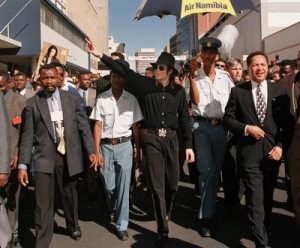Africa remembers Michael Jackson, his impact was undeniable on the continent. He broke boundaries, and records, changed things and set the standard in not just the world of music, fashion, music videos, movies, pop culture and even geopolitics. He was more than an entertainer, he was Africa’s illustrious son and King of music.
Fifteen years on and his name is still in the conversation. This piece would serve as a recollection of his visits, charitable works and events he had in Africa that remain as timeless memories in history.
First Visit – The Jackson 5, African Tour (1974)
As a member of The Jackson 5, Michael Jackson traveled to the continent for the first time in 1974. The Motown brothers’ “African Tour” was originally scheduled to include stops in Ghana, Zambia, and Ethiopia, but it was cancelled. Rather, they stayed in Senegal, travelling from Dakar to the fishing village of Joal and the island of Goree, which served as the departure point for Africans who have been abducted and sold into slavery.
First Charitable Act for Africa, January 28, 1985
One of the first performers to arrive to “A&M Lion Share Studios” for the recording, which is now considered historic, was Michael Jackson. Through it, hundreds of highly regarded musicians came together with the goal of easing the starvation in Africa. The largest-grossing single in recording history, “We Are The World,” was recorded during an all-night session. The song also became the subject of a book and a videocassette, the sales of which supported relief efforts for hunger. As a result, $60 million was sent straight to the nations that were most impacted. In addition to being a featured artist, Michael Jackson recorded the demo tracks that were sent to the other artists and co-wrote the song with Lionel Ritchie.
Second Visit to Africa, February 11 – 18, 1992
Michael traveled 30,000 miles in 8 days across Gabon, Cote d’Ivoire, Tanzania, Kenya, and Libreville, visiting hospitals, churches, orphanages, schools, and charitable organizations that support the education of disadvantaged children. Remarkably, he agreed to this arrangement only if he could visit “orphanages, children’s hospitals, churches, schools, and playgrounds.” He spent time in Gabon, Egypt, Tanzania, and Cote d’Ivoire, where he was anointed a king, all under the scrutiny of the world press, which created a range of tales. His reception in Gabon was marked by signs saying “Welcome Home Michael,” and in Cote d’Ivoire, he was crowned Crown Prince of the Anyi people.
One of the longest-serving “rulers” in Africa, Omar Bongo (shown below), invited him to visit Gabon. With over a hundred thousand people in attendance, President Omar Bongo, who served as the official host of the artist’s tour, awarded him the Medal of Honor for the West African nation. Not only has the medal been awarded to heads of state and other high-ranking dignitaries, such as Nelson Mandela, but President Bongo informed Jackson that he was the first artist to ever get it.
Jackson’s visit was first suggested by President Bongo’s consultant Charles Bobbit, who also appointed his son Ali Bongo and daughter Pasoaline Bongo, the country’s then foreign minister, to lead the tour.
Third Visit to Africa, 1996
Jackson visited Cape Town, Johannesburg, and Durban, South Africa, as well as Tunis, Tunisia, as part of his 1996–1997 ‘HIStory’ world tour. Michael gave the money he made from his concert in Tunisia on October 1, 1996, to “The National Solidarity Fund,” a nonprofit organization that fights poverty.
Fourth Visit to Africa, May 17, 1998
In Namibia, Michael accompanied African leaders in demanding debt relief and a new beginning for the world’s poorest region, particularly for the children.
Michael declared he would contribute money to improve the world for future generations during the yearly “Southern African Economic Forum” event in Windhoek. He declared that he would be looking at international ventures with “Barden International,” his then-new business partner, that would improve children’s lives and provide economic empowerment to the populace. He pledged, “We are going to put our money where our mouths are.”
Fifth and Final Visit to Africa, September 4, 1999
There was a lot of love between Nelson Mandela and Michael Jackson. Mandela praised Jackson’s ability to “triumph over tragedy on so many occasions in his life” and called him “a close member of our family” in prepared words read at Jackson’s funeral. He stated, “I’ve had the time of my life here, I’ve had so much fun, I hate to leave,” standing next to South Africa’s first black president. Furthermore, I’m seeking to buy a house here and live here for the rest of my life.” He gave a one million South African rand check to Nelson Mandela for the “Nelson Mandela Children’s Fund.”
READ ALSO: Is AfDB impacting education in Nigeria, Malawi?
Other Charitable Acts for Africa
To help raise money to battle juvenile AIDS in Africa, Michael gave a limited-edition poster and one of his signature fedoras for an auction at the annual dinner of the “African Ambassadors’ Spouses Association” in October 2000.
On March 6, 2001, Michael gave a black hat, a birthday phone call, and a jacket he had worn to the 2000 Monaco Music Awards to the “Movie Action for Children” auction, which UNICEF hosted. All of the money raised went toward supporting UNICEF’s work in preventing HIV transmission from mother to child in Africa.
Michael Jackson’s legacy in Africa is not merely a collection of memories; it’s a testament to the transformative power of music and art. He was a bridge between cultures, a champion for the marginalized, and a reminder of the boundless potential that lies within each of us. As Africa continues to evolve, Jackson’s influence will undoubtedly remain a driving force, a constant echo of the “King of Pop” who forever left his mark on the continent.









